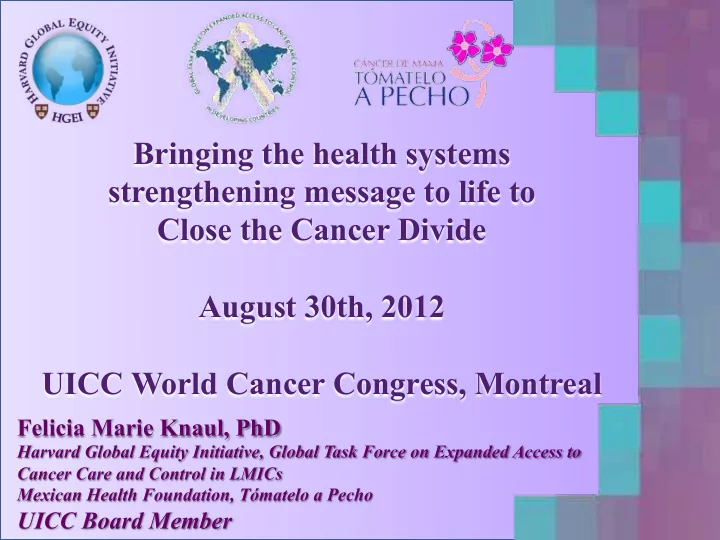

Bringing the health systems strengthening message to life to Close the Cancer Divide August 30th, 2012 UICC World Cancer Congress, Montreal Felicia Marie Knaul, PhD Harvard Global Equity Initiative, Global Task Force on Expanded Access to Cancer Care and Control in LMICs Mexican Health Foundation, Tómatelo a Pecho UICC Board Member
From anecdote … … to evidence
January,(2008( June,(2007(
Mexican Champion: Abish Romeo treatment through Seguro Popular
Juanita: Advanced metastatic breast cancer is the result of a series of missed opportunities
Develop an uplifting message that translates into action: Closing the Cancer Divide: A Blueprint to Expand Access in LMICs I: Much should be done II: Much could be done III: Much can be and is being done
A framework against which to argue that applies to many diseases: Myths about cancer/NCD/ Chronic illness M1. Unnecessary M2. Unaffordable M3. Impossible M4: Inappropriate
The Diagonal Approach to Health System Strengthening ! harness synergies that provide opportunities to tackle disease-specific priorities while addressing systemic gaps. Delivery : Harness platforms by integrating breast and cervical cancer prevention, screening and survivorship care into MCH, SRH, HIV/AIDS, social welfare and anti-poverty programs. Example: • Mexico: integration of breast and cervical cancer awareness and screening into the national anti- poverty program Oportunidades
Link global health + cancer care
Link to broad issues of development: Cancer – Stigma: especially in women and children - adds a layer of discrimination onto ethnicity, poverty, and gender.
An Equity Imperative The cancer divide: a disease of both rich and poor but the poor suffer ever more: 1. Exposure to risk factors 2. Preventable cancers (infection) Facets 3. Treatable cancer death and disability 4. Stigma and discrimination 5. Avoidable pain and suffering
The Opportunity to Survive (M/I) Should Not Be Defined by Income 100% Adults Children inequality gap Survival Leukaemia All cancers LOW HIGH LOW HIGH INCOME INCOME INCOME INCOME In Canada, almost 90% of children with leukemia survive. In the poorest countries only 10%. Source: Knaul, Arreola, Mendez. estimates based on IARC, Globocan, 2010.
The most insidious injustice: lack of access to pain control ! Non-methadone, Morphine Equivalent opioid consumption per death from HIV or cancer in pain: Poorest 10%: 54 mg per death Richest 10%: 97,400 mg per death
Lessons from other diseases Initial views on MDR- Outcomes in MDR-TB TB treatment, c. patients in Lima, Peru 1996-97 receiving at least four months of therapy “ MDR-TB is too Failed expensive to treat in Died therapy 8% Abandon 8% poor countries ; it therapy Cured 2% detracts attention and 83% resources from treating drug-susceptible disease.” WHO 1997 All patients initiated therapy between Aug 96 and Feb 99
Successful lessons from cancer: Mexico: cervical cancer. 16 12 8 4 0 1965$ 1975 $ 1985 $ 1995 $ 1955 $ 2008 $ Source: Knaul et al., 2008. Reproductive Health Matters, and updated by Knaul, Arreola-Ornelas and Méndez based on WHO data, WHOSIS (1955-1978), and Ministry of Health in Mexico (1979-2006)
Rural Rwanda: 0 oncologist Burkitt´s lymphoma Embryonal Rhabdomyosarcoma Source: Paul Farmer., 2009
Use economic arguments and data `5/80´ cancer disequilibrium (Frenk/Lancet 2010) Almost 80% of the DALYs lost worldwide to cancer are in LMICs, yet these countries have only a very small share of global resources for cancer ~ 5% or less.
Investing in CCC: We Cannot Afford Not To 1/3-1/2 of cancer deaths are “avoidable”: 2.4-3.7 million deaths, 80% in LIMCs ! Economic cost of cancer, 2010: 2-4% of global GDP ! The costs of prevention and treatment are less that many fear
PUBLISH: From anecdote … … to evidence
Be an optimist optimalist Expanding access to cancer care and control in LMICs: Should, Could, and Can be done
Recommend
More recommend